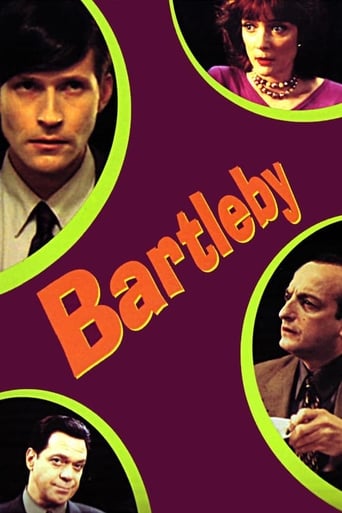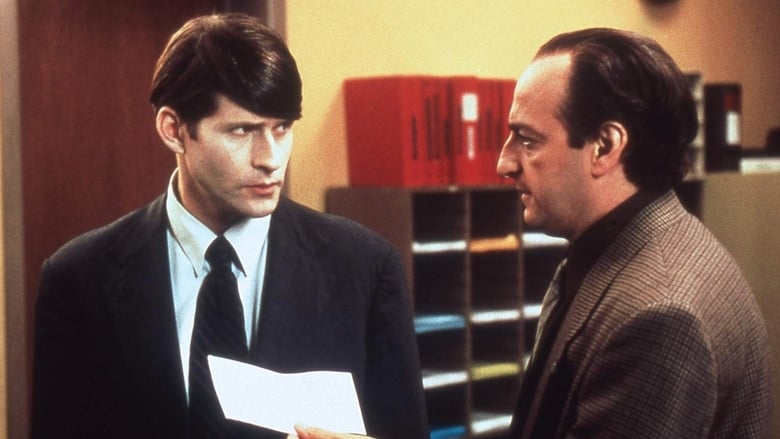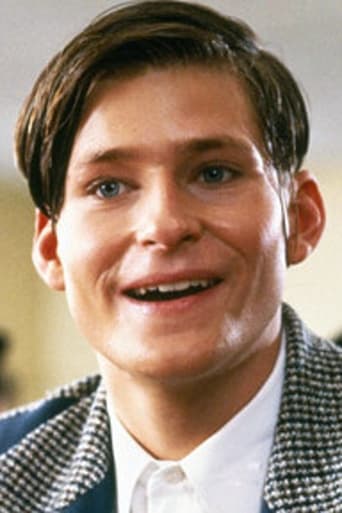Bartleby (2001)
An adaptation of Herman Melville's short story "Bartleby, the Scrivener" told in the setting of a modern office.
Watch Trailer
Cast


Reviews
Masterful Movie
Not sure how, but this is easily one of the best movies all summer. Multiple levels of funny, never takes itself seriously, super colorful, and creative.
Great movie. Not sure what people expected but I found it highly entertaining.
The film never slows down or bores, plunging from one harrowing sequence to the next.
Bartleby is one of my favorite Melville stories. However, like a lot of 19th century stories, it really does not translate well into a present-day setting. First of all, the office in which Bartleby worked in the story was nothing like the light, airy, spacious and colorful workplace depicted in this film. Nor, needless to say, were there any female characters, as depicted in the film, present to brighten up the office atmosphere. In the story Bartleby worked in an office of, by today's standards, almost inconceivable dreariness, provided with only one window, and that opening onto an air shaft. In addition there was the question of Bartleby's occupation, one which does not even exist today. As the title of the story indicated, Bartleby was a 'scrivener". That meant that Bartleby was employed in a law office to copy legal documents. In other words, Bartleby was nothing more than a living Xerox Machine. The reader must bear in mind that Melville wrote this story in the mid 1800s, long before the introduction of carbon paper or even of typewriters, let alone telephones, copy machines and computers. The only tools of the trade required by a scrivener were a quill with which to write, a penknife with which to sharpen it and a bottle of ink. In addition, as can be imagined, the people who performed that sort of work in those long-gone days were paid the merest pittance, barely enough upon which to subsist. Small wonder Bartleby took to living in the office, he probably couldn't afford to live anywhere else. Thereby one comes to the biggest flaw in the movie. Today, a character like Bartleby simply wouldn't be treated in the way in which he would have been treated during the mid 19th century. Under similar circumstances today, the employer would call the police, who would then take Bartleby way for psychiatric observation, after which he would either be put on suitable medication or committed for further psychiatric treatment. That, of course, would not have occurred in the mid 19th century, nor does it occur in the original story. One cannot watch the film version without feeling that the story simply doesn't ring true, that the story simply wound't play out the way ti does. And, of course, one would be correct, because this is essentially a 19th century story played out in a modern setting, one in which it simply doesn't quite fit. It bothers one much the same way as seeing a Wagnerian Opera in which mythical Gods and heroes are depicted wearing business suits and ties. One cannot escape the uneasy feeling that, while it all may be very fashionable, it simply doesn't fit.
Herman Melville was a pessimist, which should be unsurprising to anyone who has read him. Taken from his short, "Bartelby the Scrivener", this is the second of two-attempts to translate this story to film. The first was a good British-version (1972) that is much-closer to the original story, but suffers from being placed outside of its American-context. "Bartelby" is about America, and is Pre-Marxist in its criticisms of American-capitalism. What is remarkable is that it was written in the 1850s (unlikely to have been influenced by Marx in any way), when we were gradually becoming a business-run nation, and moving-away from being a purely-agricultural one. This process would commence more-fully after the Civil War, but for someone like Melville, living in New York City was the writing-on-the-wall.But what makes "Bartelby" so amazing and chilling is that it resonates so strongly today. The problems we face now, due to the distortions inherent in our economic system, are still with us.If Melville said anything in his short-story, it was this: "What will become of the Bartelbys of the world?" Not everyone fits-into this job-system, and this should be no-surprise regarding an economy of "winner-takes-all", money-Godism. Under our profit-motive economy, people are simply left-behind, and Melville challenges our indifference to the needy.This was a very small-production, so I can understand why it is almost unknown. These are often the best films.The character Bartelby is more than just a non-conformist--he represents everyone who is neglected by our culture and economy. He reminds-us of the inhumanity in our daily-lives. Melville enjoins-us to help the next Bartelby we see, and acknowledge our responsibility for the way things are. The office-boss character feels he isn't responsible for Bartelby and his "I would prefer not to" difficulties, but Melville is really saying that he IS. There is an implied collective-guilt in the story that would not be addressed adequately until the Holocaust, which helps it retain a sense of the contemporary. Melville even prefigures Kafka and the school of absurdism in his story, it is genius. This film is an expert updating of this story, and it works well! It's both funny and pitch-black in its despair regarding modern life. Crispin Glover is inspired, with the qualities of a silent-film actor (Lon Chaney, or Conrad Veidt from Caligari) in his expressiveness, and there are some great slapstick-gags. This is film-making at its best, it's what you need. You will feel vindicated.
The phrase "I prefer not to" uttered by the titled protagonist is said with such honesty that it's hard to argue with it when it's spoken. This is a modern update of the Herman Melville story and I think the modern setting actually enhances the attitude of the story. Story is set in a Public Records Office and The Boss (David Paymer) is looking to hire someone to help out with the workload. He has a secretary named Vivian (Glenne Headly) who is very flirtatious and it's she that puts the ad in the paper for her boss. The other clerks are Rocky (Joe Piscopo) who is a male chauvinist and proud of it, and Ernie (Maury Chaykin) who is just incredibly inept and clumsy. After the ad hits the paper a man applies for the job. Enter Bartleby (Crispin Glover), a very quiet loner that wears the same suit and speaks very little. At first he works very well and files everything that he is suppose to but one day The Boss asks him to do something and he utters "I prefer not to". In fact, Bartleby stops working completely and when asked to do his job he repeats the phrase. The Boss fires him but he will not leave. Finally, The Boss moves the whole office to another building which leaves Bartleby with nowhere to go. *****SPOILER ALERT*****Bartleby becomes homeless and when The Boss tries to help he says "I prefer not to". Bartleby dies under a bridge while still wearing his suit. The Boss writes a novel about him and vows to make sure Bartleby's existence is not to be considered meaningless. The film is directed by Jonathan Parker and he shows some promising style to this low budget production. The look of the film is very colorful and most of the colors comes from the scenes inside the office, where the majority of the film takes place. Parker shows the office as the most insanely boring deadend job on the planet but the work environment of these poor clerks is decorated in bright colors and the outfits that the characters wear are unusually cheery. The story makes its point fairly early on and the big flaw of the film is that it overstays it's welcome. The Melville story is short and even though this film runs barely 80 minutes it seems a bit to long. But the big asset is the casting. Say what you will about the story, but Crispin Glover was born to play Bartleby. I just can't imagine another actor in this role. One of the things that I admire about his performance is that when he utters the phrase "I prefer not to" he does it differently each time. All with complete honesty but his tone, his inflection and his overall mood is different each time. This is not a great film with a great message but it is an interesting retelling of Melville's story of the common man trapped in a deadend job. The direction is spirited and Glover gives the perfect quirky performance that the film needed. It's well worth checking out.
This film is offbeat, so it will turn a lot of folks off right away, especially since at first glance, people think they are going to get an Office Space-type of workplace commentary. Although the movie DOES make many subtle points about the kind of buildings and office parks people are forced to work at every day, it is true to the enigmatic essence of the Melville story. There is a lot to recommend here: Paymer provides the humanity. How funny is it when he is pretending to be a record exec and shows his young galpal his different phone lines: "Hello, Mr. Rapper? How are you doing?" The secretary is very sexy. Piscopo and the other guy make a great team of mismatched co-workers. Both fit stereotypes, but remain true characters. The production look is colorful and strange.The ending is problematic in that Paymer seems to change a bit too suddenly. His speech about his book idea comes across like the filmmaker trying to sum things up a bit too neatly. So it wasn't entirely satisfying.But the world was a fun one to inhabit.








